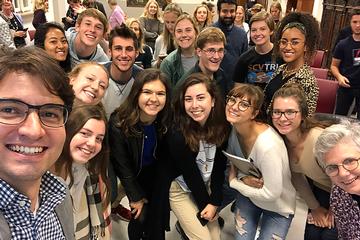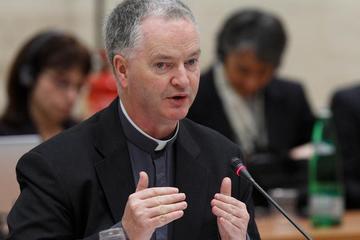
By Laura Ieraci
CHICAGO — Lay Centre deputy director Filipe Domingues proposes a new approach to overarching ethical dilemmas on social media in his first book, “Selflessness in the Age of Selfies,” launched last month.
Inspired by Pope Francis’ teachings on the throw-away culture and its applicability to media, Domingues focuses on the understanding and experience of social media by young adults, basing his research on discussions held on Facebook in preparation for the Vatican’s Synod on Young People in 2018.
To his surprise, Domingues said, young people from around the world echoed in their own words what Roger Silverstone, a prominent media and communications scholar, posits in his writings.
Describing the media in terms of the Greek polis for the current age, Silverstone underlines the exclusive nature of media, governed by rules of “appearance,” where only those who are allowed to “appear” are able to speak, be heard and exercise some level of social influence.
While young adults seem to know about the problems and risks of social media, “they don’t always know how to articulate these issues in depth or solve these problems,” Domingues said in an interview.
The young communications scholar presents the bulk of his research and analysis on young people and social media in his book’s third chapter. In the first two chapters, he explains how media systems work and how social media developed in an already heavily mediated culture, fueling the hyper-individualism and indifference characteristic of the throw-away culture.
“I think people in the Church are still used to talking about social media as tools, as neutral tools, something you use for good or for evil,” Domingues said.
But social media need to be understood as environments — moral spaces — deeply intertwined with all aspects of daily life, he said.
.jpg)
In the book’s final chapter, Domingues extends his moral reflection. He builds on the concept of “media hospitality” that Silverstone proposes as an ethic for greater inclusivity in media, by making space for different people and voices on the margins to “appear” and be heard.
While this ethic may be applied by legacy media — privately or publicly owned print, radio and television — it is near impossible to implement evenly across the board on the internet, which is not owned by any one person or organization, Domingues argues.
In response, Domingues proposes a new approach, based in both virtue ethics and Catholic social teaching — “media solidarity.”
The highly individualized nature of social media requires that we call on individuals to exercise virtue online, person-to-person, he explains.
In an environment where people seek “relevance” based on the number of interactions with their social media posts, Domingues proposes a reinterpretation of relevance based on one’s positive impact on others — a quality over quantity argument — through interactions that prioritize and promote the other rather than the self. To exercise selflessness online in an age of relentless self-promotion is one way toward an online environment that is more respectful of the dignity of the human person.
To this end, Domingues recognizes the need to educate toward media solidarity, by teaching solidarity as a virtue and increasing awareness among young people about the positive impact of their good choices and actions online, such as crowdfunding projects for people in need.
“By saying solidarity is a virtue — not only a principle — it is something I can pursue, that I can do in social media spaces, too,” he said. “I don’t have to compare myself so much with others. I can open myself to different ideas without having to destroy or cancel people. I can look at things differently now because I’m looking to become a better person.”
However, Domingues acknowledges that a more ethical and solidary online environment also requires technology companies to exercise greater responsibility and accountability for their user systems, which in their design are currently exploitative and contemptuous of the human person.
“If YouTube, for example, keeps prompting me with aggressive videos — I’ve watched one video and the next one up is more aggressive than the last — it becomes addictive, and in the end, I’m a victim of that structure,” he said. “I might have the choice to turn it off, but I’m also a victim of that seductive kind of content.”
Domingues said the book was motivated by a perceived need in the Church for a greater understanding of the dynamics of social media and its effects on young people in particular. It presents his doctoral work at the Pontifical Gregorian University for a wider church audience, namely pastoral leaders, formators and youth workers.
In the preface, Sister Nathalie Becquart, an undersecretary for the Synod of Bishops, underlines the contribution of the concept of media solidarity to the Church’s reflection on social media and to efforts that seek to foster a greater culture of encounter and reciprocity in online environments.
She also suggests this book can “inspire those in the Church who are trying to find new and creative ways of listening to all people and seeking to consult and involve them in common discernment for the service of the world, especially during this time of pandemic in which we have discovered the importance of a good and responsible use of digital media.”
“Selflessness in the Age of Selfies: What Young People Can Teach Us About Social Media’s Throw-away Culture” is published by Gregorian & Biblical Press, as the sixth volume in its Church & Society Series. The book is available via the publisher, G&B Press, by clicking on this link and through Amazon.
Photo credits: Man with mobile phone Unsplash (Emmanuel Ikwuegbu) / book cover G&B Press / portrait Filipe Domingues by Stefano dal Pozzuolo
Dr. Filipe Domingues was appointed Lay Centre deputy director effective October 8, 2021.


